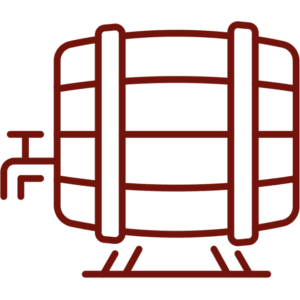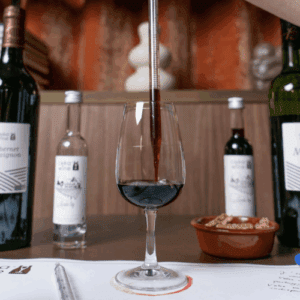
Learning to Taste Wine: A Sensory and Immersive Experience
Tasting wine is not just about drinking it, it’s about learning to analyze, understand, and fully appreciate it. Whether you are a curious amateur or an enthusiast, it is possible to develop your palate in a few simple and accessible steps.
In this workshop, we offer a fun and educational approach to discovering wine differently. Far from overly technical or intimidating tastings, here, everyone learns at their own pace in a friendly environment.
WHAT ARE THE GOALS OF THIS WORKSHOP?
The experience doesn’t end when the glasses are empty. This workshop will give you simple and effective benchmarks to:
![]()
Better understand what you like and why
![]() Enjoy tasting without being influenced by ready-made descriptions
Enjoy tasting without being influenced by ready-made descriptions
![]() Feel more comfortable choosing a wine with confidence
Feel more comfortable choosing a wine with confidence
The ultimate goal: To give everyone the keys to appreciate wine in their own way, with curiosity and pleasure. You are unique.


Why Learn to Taste Wine?
Tasting a wine is not just about saying whether it’s good or not. It’s a true sensory discovery that allows you to better understand its origin, grape variety, and production method.
Participating in a tasting workshop means:
- Developing your palate by learning to identify aromas and flavors.
- Better understanding wine styles and the differences between terroirs.
- Knowing how to choose a wine based on your tastes and occasions.
The goal is simple: to make tasting accessible to everyone and provide the keys to appreciate each glass with more meaning and pleasure.
An Immersion in the Heart of the Vineyard
Before tasting, it is essential to understand what forms the soul of a wine. This workshop begins with an immersion at Château Vieux Mougnac, a family estate near Saint Émilion that has preserved winemaking know-how for five generations.
During this visit, you will discover:
 The importance of the terroir and its impact on regional wines
The importance of the terroir and its impact on regional wines The different stages of winemaking, from grape to bottle
The different stages of winemaking, from grape to bottle The uniqueness of the Bordeaux vineyard, which offers a unique diversity
The uniqueness of the Bordeaux vineyard, which offers a unique diversity This immersion helps to better understand the origin and uniqueness of wines before tasting.
This immersion helps to better understand the origin and uniqueness of wines before tasting.
The Basics of Tasting: Observe, Smell, Taste
Tasting wine is about learning to listen to your sensations without trying to intellectualize everything. This workshop offers a simple approach, discovering wine at your own pace by focusing on what you truly feel.
Observe: What does the color of the wine tell us?
Even before smelling it, wine is observed. Its hue already gives valuable clues about its age and evolution.
Is it light or intense? Does it have vibrant or deep reflections? During the workshop, we take time to compare colors and connect the hue with the wine’s maturity.
Smell: A Matter of Memories and Emotions
The sense of smell is deeply linked to memory. A simple scent can awaken a specific memory, a forgotten feeling. That’s why we don’t try to impose precise aromas, but rather identify the olfactory family that speaks most to you. When smelling the wine, you might find:
- Fruity notes (red fruits, black fruits, citrus, exotic fruits…)
- Floral notes (white flowers, dried flowers, fresh herbs…)
- Spicy or woody notes (vanilla, cinnamon, undergrowth…)
There is no right or wrong answer: what matters is identifying what you feel and putting words to your own sensations.


Taste: Acidic, Bitter or Sweet?
In the mouth, the wine fully reveals itself. Here, we will try to determine its main taste sensations:
- Acidity: brings freshness and makes you want to go back for more
- Bitterness: can be light or more pronounced, depending on the tannins in red wine
- Sweetness: some wines are completely dry, others offer a softer, mellow sensation
By taking the time to analyze these sensations, you will better understand the wine’s balance and personality.
Exploring Bordeaux Wines: A Comparative Tasting
To better grasp the diversity of Bordeaux wines, this workshop offers a comparative tasting of four wines from the region. Through this experience, everyone can refine their perception and discover what they enjoy.
A First Contact with a Dry White Wine
We will begin with a dry white wine. After observing it, we’ll take the time to identify its aromas and structure on the palate.


Two Red Wines, Two Expressions of the Bordeaux Vineyard
Bordeaux is a region where red wines show great stylistic diversity, shaped by unique terroirs. To better understand these nuances, we’ll taste two wines from distinct soils and climates:
A right bank wine: with clay-limestone soils and a milder climate, this bank favors round and velvety wines, often Merlot-dominant.
A left bank wine: where gravelly, well-drained soils and a stronger maritime influence allow Cabernet Sauvignon to thrive, producing more structured wines built for aging.
The goal of this double tasting is to explore how these terroir differences influence the wine’s character: its structure, aromas, and mouthfeel. Focusing on your own sensations, you’ll identify what sets these two expressions apart.
A Sweet Ending with a Dessert Wine
Finally, the tasting ends on a sweeter note, with a dessert wine. How does it behave on the palate? What sensation does it leave after tasting? We’ll take the time to explore these questions.
Through this workshop, everyone can refine their palate with ease, enjoying the discovery of these wines without trying to analyze everything technically.


A Moment of Sharing Around Wine
Tasting wine is not just about analyzing it — it’s also a moment of pleasure and sharing. This workshop is designed to be a convivial time, where everyone can ask questions and share their feelings without pressure.
– A REINVENTED SENSORY APPROACH –
Dégustez Autrement invites you to experience wine differently. Rather than sticking to a traditional tasting, this event lets you enjoy the subtleties of each vintage through an approach that stimulates your senses. Whether it takes place as a cocktail event or in a more intimate setting, the goal is to create a warm atmosphere where the tasting experience becomes a shared pleasure. –



